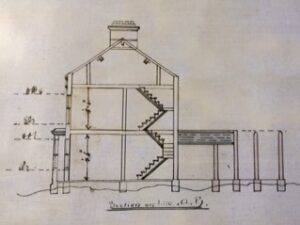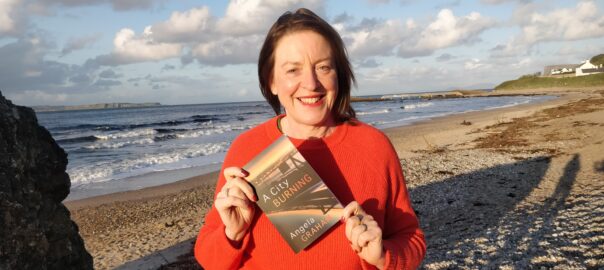As her debut short story collection A City Burning, is published, we interview Angela Graham to find out more about the book and what inspires her.
In the twenty-six stories in A City Burning, set in Wales, Northern Ireland and Italy, children and adults face, in the flames of personal tragedy, moments of potential transformation. On the threshold of their futures each must make a choice: how to live in this new ‘now’. With a virtuoso control of tone, by turns elegiac, comic, lyrical, philosophical, A City Burning examines power of all types. The result is a deeply human book full of hauntingly memorable characters and narratives.
What is the meaning behind the title A City Burning?
In the opening story, ‘The Road’, a young girl witnesses her city blazing. She understands that this is a sign of the collapse of the status quo, of all the usual certainties. She is confronted with the need to react to this new situation. What values should guide her in this choice? I realised that this story encapsulates the theme of many stories in the collection – witnessing major change and having to work out a response. It seemed a fitting title for the book.
There is a theme of change in this collection, what, if anything, do you hope the reader can take away from this underlying message?
I haven’t thought in terms of such a message – at least, not while I was writing the stories. It wasn’t until late in the day that I saw that facing change was a link between them, and it took someone else, an editor, to point that out. In an important sense, I had to understand my own work from a more objective perspective. I’d like readers to recognise that ‘the given’ (whether positive or negative) can break down in very noticeable and in very subtle ways. One person sees a city burning, another sees some detail in a single photograph that opens their eyes. Usually, I believe few such opportunities for perception appear out of the blue. We have usually been sensitized to a shift in circumstances but we may be unwilling or unable to respond at an earlier point.
I’ve just looked up the etymology of ‘catastrophe’. The word comes from kata- ‘down’ + strophē ‘turning’. I imagine that as the point at which a wheel, goes into its irreversible downward momentum. We have watched the wheel move upwards and we know something has to give but we are not always prepared for it.

Anywhere that’ll have me! To give an example, the story, ‘Life-Task’ which is set in northern Italy at the end of the Second World War came to me because a person who had just retuned from Italy recounted a story she’d been told by someone who’d had it from someone who’d heard it from the actual protagonist. It must have been brilliantly told originally to be so vivid (after passing through several tellings in this way) for it to reach me so powerfully that I could see the events as the story was shared with me. I went home and wrote it down. Of course, it helped that I had, for completely other reasons, been doing research into post-war Italy, had read Italian novels on the subject, and taken a particular interest in what happened in northern Italy when the Germans (the allies of the Italians) had been defeated. And, in writing a story, one has to aim for a satisfying balance between all the elements. This may introduce material which is not part of ‘the original’.
Do any of the stories draw on personal experience?
This is a book of fiction. It’s not memoir or autobiography. It’s all made up. But it’s true to experience, my own and that of many others.

You engage with a number of different languages in the book including Ulster Scots in the story ‘Coasteering’. Why was it important for you to foreground these languages in the collection?
I have always been interested in languages and I’ve worked in Wales for a long time, a country where two languages are in use alongside each other. I learned Welsh as soon as I moved to Wales when I married a Welshman. In Northern Ireland I had much experience of the link between language and identity; even nuances of accent, in a city such as Belfast, are sifted for meaning. Whenever a chance has presented itself to get involved with a language I’ve tried to take it. For example, I did a crash-course in Romanian as part of the writing of a screenplay set in that country and it made a big difference, when I was researching there, that I could follow what people were saying. I learned Italian by ear when I was a teenager and, again, I wrote a screenplay, set in Puglia. Most of the time, people are pleased that one has made an effort to allow them to stay in the language in which they are most comfortable, most ‘themselves’.
In regards to Ulster Scots, that fascinates me. I have written the first draft of a novel in which two major characters are Ulster Scots-speakers and language, including Irish, is key to the book. Clashes over language and culture are deep-rooted in Northern Ireland but there is also great potential to overcome seeing language as an obstacle. I’ve worked with a number of Ulster Scots writers. My father’s family are Ulster Scots. It’s important to me that Ulster Scots takes its place in contemporary literary fiction.

The Road. In its 800-or-so words I’d like to think it pushes that wheel up out of catastrophe; gives it a push into an upward turn.
You’ve added some new stories based on the pandemic in the last few months. Why did you decide to write about it and were they hard to write?
They were not hard to write in that I was fuelled by indignation at the plight of low-paid workers whose interests were not given proper consideration. I have personal experience of the ‘worlds’ of both stories and I felt able to depict them forcefully. I checked out facts, naturally, but the internal impetus was immediate. Once again, it seemed to me, the people who are considered ‘least’ in our society − least important, least powerful − were receiving least attention, whereas if their needs were a priority we’d have a better balanced society in which to live.
You turned to writing full time a few years ago. How did you first get into writing and what has it been like working up to publication of your debut collection during the pandemic?
I committed solely to writing because I was busy with media work and I felt the need to sharpen my focus. Writing is what I have always done, since I was about six years old. My first poem was published in a mainstream magazine when I was seven and I wasn’t one bit surprised at the time. I knew that was what magazines were for – publishing stuff. I had a very child-like view of things. Of course. Very naïve. It’s by no means easy to get work published. And that’s a good sign – there are so many exceptionally talented writers.
I’ve always written but usually for the screen. I’ve done journalism and radio work and non-fiction tv tie-in work and poetry. A City Burning is my first chance to pull a substantial amount of fictional material together into a coherent whole.
Once I’d negotiated the early days of the pandemic – the practicalities − the pandemic (because I was lucky to stay well) made no great difference to the practice of writing at a desk. There were fewer distractions. But there was no access to libraries and I had planned to do an in situ major piece of writing for a month and the restrictions made that impossible. I had to re-invent the form of the work. It’s a book on my childhood in Belfast, partially supported by a Support for the Individual Artist Programme award from the Arts Council of Northern Ireland and the National Lottery.

Acquiring a cover photo for A City Burning was hard in the lockdown circumstances. It would have been lovely to have had the launch I had been hoping for in Belfast’s No Alibis bookstore and I would have had a small one in Ballycastle, County Antrim which is where I’ve spent lockdown. Ballycastle Library is accepting a copy of the book, I’m pleased to say. Filming and editing a promotional video had to be done by ingenious means by my director husband, John Geraint. Sending paper proofs back and forth was interesting because of blips in the postal service. But the attention from Seren’s staff has been the key thing and that was undiminished.




I’m just watching on NVTV and Angela is on. Fascinating. I must read A City Burning. Her knowledge and love of languages is impressive.